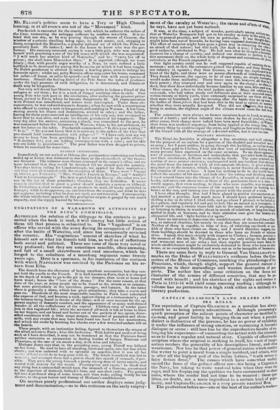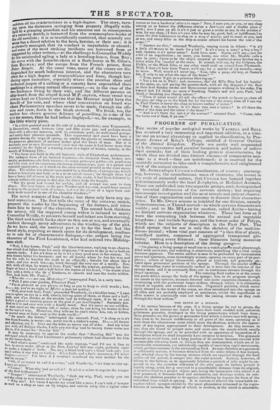CAPTAIN GLASCOCK'S LAND SHARES AND SEA GULLS.
THE reputation of Captain GLASCOCK as a novelist has always struck us as being purely adventitious. Although possessing' quick perception of the salient points of character as modified .by custom, and great facility in bringing them out when a peculiar dialect is distinctive of the persons, he has no power of exhibiting it under the influence of strong emotion, or sustaining it hermit dialogue or scene : still less has he the reproductive faculty den. larging his experience—of connecting the actual with the invented, so as to form a regular and natural story. Capable of effective de. scription where the original is striking in itself, his want of unags nation renders the generality of his descriptions literal, and often wearisome. Nor has he that power of generalization which enables the writer to point a moral from a single incident, and attain, what is after all the highest end of the belles lettres, " truth severe a fairy fiction drest." 'rhe causes which have somewhat unduly raised the fame of the gallant officer are—his being a Captain in the Navy, his taking to write nautical tales when they were the rage, and his displa)ing the qualities we have enumerated in short tales, where the reader had not time to be wearied : these qua' ltties, no doubt, are a main ingredient in a certain kind of pupa' larity, and Captain GLASCOCK is a very prosaic nautical Boz.
The production before us—one of the best of the author's works-
raseso°'
Waits a
r ll his characteristics in a high degree. The story, turn- urn the distresses springing from property illegally with- bald urasping guardian and his amorous son in consequence da b—a k9 a grasping match, is borrowed from the commonplace-books of rb;oldrinovelists ; it is so inartificially contrived, that scarcely any roe has a direct relation to the hero, heroine, or their son ; it is so chansily managed, that Its conduct is improbable or absurd; sod some of the most striking incidents are borrowed from or geted by other writers,—as the challenge to Counsellor Waddy flourghiss-tinintended ogling a lady at a boarding-house, from Boz ; the scene with the housebreakers at a flash-house in St. Giles's, from Buhwee; and the escape from the French prison, from peter Simple. At the same time, many of the scenes are dis- tinguished for much ludicrous interest, and the characters very often for a high degree of vraisemblanee and force, though bor- dering upon caricature, especially where the peculiar ideas and technical jargon of a calling or a country have superadded their markings to a strong natural idiosyncracy,—as in the ease of the two Irishmen living by their wits' and the different persons on ship-board, from the stupid finical M.P. captain, whose vessel was always kept on Channel service that the Minister might have the benefit of his vote, and whose chief conversation on board was about Parliamentary speeches never to be made, through the offi- cers and crew, down to the black steward. We think, too, the author has shown greater delicacy of pencilling, in some of his quitter scenes, than he had before displayed,—as, for example, in this little wintry piece.
" In a little pastoral nook on the side of a sharp acclivity, near Teignmouth, in Devonshire, stood, between forty and fifty years ago, and perhaps stands there still, a pleasant mansion, with its miniature park, its well-stored grange, and neatly-kept pleasure -grounds. This sequestered spot must have been a paradise during the reign of spring, or amidst the glories of summer, or when degorgeeus plenitude of autumn tnakes glad the heart of man. But it is necessary now to view Ravenswood (such was the name it had borne more than a century) by the light of a wailing moon in a night of winter, namely, in the month of February 179-.
" The house was built in the old fantastic style of Elizabethan architecture. The embayeu fin In of its latticed windows—its irregular front, broken into sundry projections—its little turrets—its many grote-que gables—its ponderous and kitty roof, and its iluinerous clustering chimney-tops, gave it a quaint and romantic appearance, as it stood on the snow-covered ground in the slant moon- shine. The edifice was almost surrounded by a shrubbery if evergreens, which looked as luxuriant and leafy as in a nu re genial season ; for though there had been sheave fall of snow in the eat ly part of the night, it had been followed by a breeze sufficiently strong to dislodge the flakes from the boughs.
" But the gusts had ceased for awhile, and all around was now in deep silence. The very house, as the port Wordsworth has said, would have seemed to Bleep in the general hush of nature, had not the gleam of a taper been sud- denly made manitst in one of the chamber windows."
The novel consists of four books; but three only have any na- tural separation. The first tells the story of the runaway match, prepares the reader for the beginning of the distress, and intro- duces him to many of the characters. The second book thickens the misery, till the supposed young widow is induced to marry Counsellor Waddy, to preserve herself and infant son from starving. The third and fourth books show us this son at sea, and eventually conduct through many adventures to the winding-up of the plot. As we have said, the nautical part is by far the best: but the literal style, requiring so much space for its development, confines us to one bit of characteristic dialogue,—the subject being the character of the First Lieutenant, who had ordered two Midship- men aloft.
" Well, I dun know, Paul," said the Quartermaster, replying to an observa- tion which had fallen from his surly shipmate, "it seems to mean we'te both on opposite tacks. I doe n't deny as he is n't a very good man in his station. No man knows better his business; and we all knows when he has his way and has his will, he handles the craft to an affigraffy ; knocks her about like a cutter, and can work her—ay, work through the very eye of a needle. But, still, with all that, he wants it here, Paul," said the veteran, pointing his fore- sager at least a hand and a half below the region of his heart, "he wants what they calls a little o' the ile o' kindness, to smooth and ease the works within. Now, look here, Mr. Paul—"
"Who the — are you Misteriny :2" interrupted Paul, in a surly tone. "Well, I axes your pardon, Pleasant Paul." "I'm as pleasant as you please, so long as you to keep to civil words; but, d— me, you've no right to Mister a man for nothin'.
"Well, now look here, Paul," proceeded Weatherly, in a kindlier tone," I axes you to splice an eye in a stiff, closely laid-up piece of three, or three and a half; well, now d'ye thinks, as the strands 'oud so willingly open, if so be as you hadn't a piece o' coaxing grease at the pint o' yer marrnspike? Sartainly not. And suit is and ever was with a kindly word. But it's never no use a-talkin. A man must see the warsity side o' natur, afore he can bring his brains to bear in the mega' way. Moreover, they tells me he can't claim kin, cat, or kitten, to mortal man or !lain' soul in the wide world—" "So much the better," interrupted the uncouth Paul, "A chap as is n't free from friends, is never—no, never worth a tinker's curse. ll— all favour
and affection, say Give MC the feller as serves out all alike. And say what you will, old Badger- the-bo, I tells you the ship 'oud be twenty times worse nor she is, if it waunt for ' Bars lin' Bill.' "
It may be necessary to apprize the reader that "Bawling Bill" was the sobriquet which the First Lieutenant's pulmonary talents had obtained for him on the lower-deck.
"And what's more," continued the surly topman, "anti I'd say, it face to face to every. reefer afloat in the fleet, Itawlin' Bill was right, perfectly right to make a sample o' both. No, no ; a blind look-out's a blind look-out; you can't soften it one way or t'other. It's a fault, and a fault, moreover, I'd never forgive_nercr .! I'm bleat if I wouldn't masthead my own mother for the titular crime."
"Ohs, if ye comes to call it a erinse," said Weatherly, "it's time to clue up. I says no more."
"Crime! What else 'oud ye call it ? Is at it a crime to capsize the temper of the first leaftennant ? "
"Temper! " interrupted Weatherly, "dash my wig, Paul, surely you are not the chap as now wants to talks o' temper ? " " Why not? Is't 'cause I speaks my mind like a man, I cau't talk o' temper at well as a chap as uses an sly tongue, and snivels away like a sights' cata- maran as has a hankerin' after a he soger ? Now, I axes you, or you, or any chap among ye as knows the difference atwixt a Jew's-eye and a double piece o' pork ; now I axes ye all, is n't it just as great a crime as any in the articles o' war, for any chap, ( I does n't care who he may be, good, bad, or indifferent,) to cause the first leaftennant to clap on a mug o' misery, and to snarl at you, and at me, and every feller in the ship as comes athawt his hawse the rest o' the cruce?"
" Answer me this," returned Weatherly, waxing warm in debate : " is n't a little all( Wince to be made for a Jail? Is n't a man a mau ? a boy a boy? and, damme, is n't natur natur? Look here, DOW. S'pose we'll say—just for a bit of an argyfication ; no more, you know, nor what Mr. Muddle calls a case in pint ; s'pose so be the ship's corporal or maater.at-arnai fetches me a letter when I'm aandin' at the conn. It corned, will say, by the Colpoys, the Pickle, or the Black Joke, or any other small craft as coined from Plymouth. Well, I does n't hear from Nance, we'll Pay, for a matter of six months—may be more. Well, wou'd n't natur say, Tom, take a peep, old boy, at Nance's fist, if only to see what she says of the brats?"
"Tom, natur 'd get ye a precious blowing-up." "Not a bit on it, Patti; and, moreover, tho' old Billy Blue bad his buotin' at the main, ay, and pacing the quarter-deck, with all the skippers o' the fleet in their best Sunday swabs and three-corner scrapers walking in his wake, I'm b'eased but I'd think no more o' breaking Nance's seal nor you, Paul, 'oud think o' breaking you liberty ashore." "Then, if natur would n't tell the officer o' the watch to heave ye clean off the gun, an' clap ye in the black list for the rest o' the cruce, then all I can say is, Paul Potter is never the chap as knows nothin' o' natur." "But I say, my hearty, is n't there two sort o' :wins? Is n't there the natur o' the man and the natur o' the beast ?"
" And is n't there the netts o' the aims? " retorted Paul. "Come, take the tarns out o' that, if ye can."



























 Previous page
Previous page